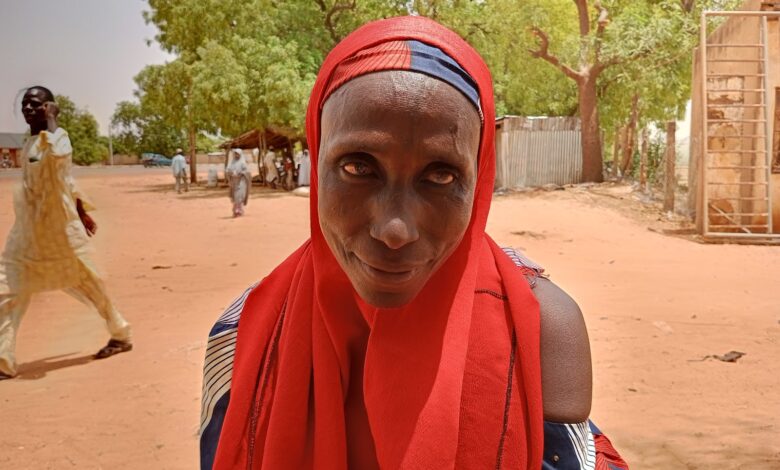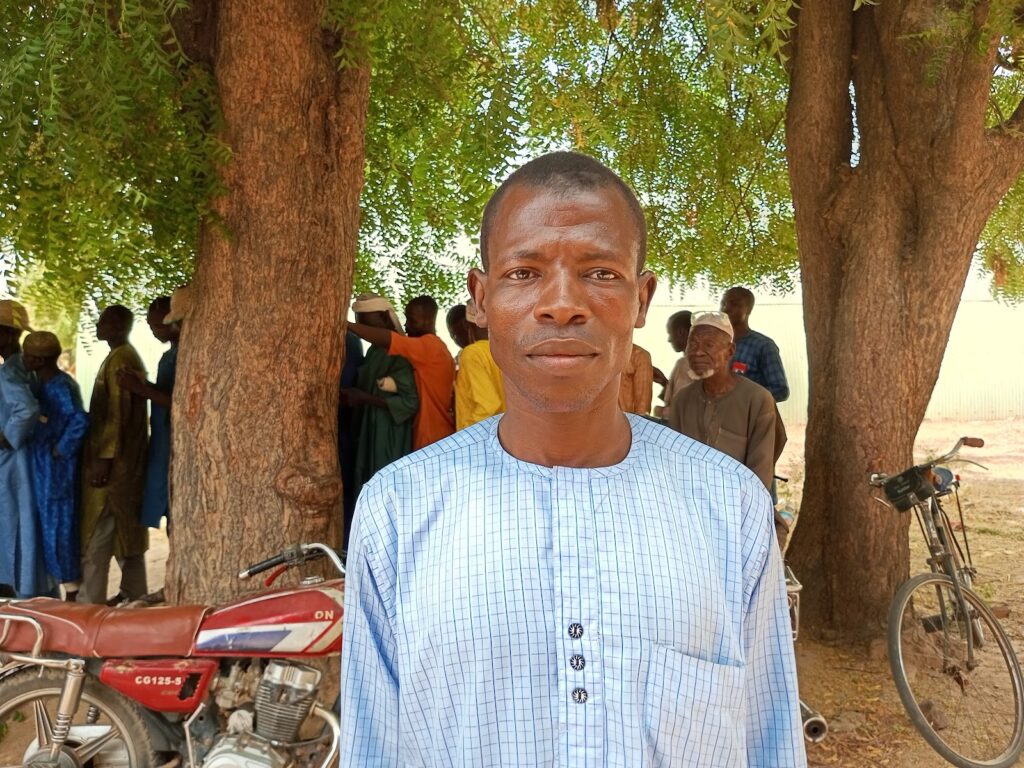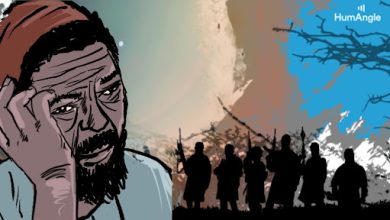Family Of Abducted Bride Call For Help After Negotiations Stall Over Naira Shortage
Rukayya Mani and her friends were kidnapped last December in Zamfara, Northwest Nigeria, while she was preparing for her wedding. Their chances of reunion with their families have been dashed by the cash shortage.

Rabi Alhaji Hasan, 59, hears her daughter’s voice in her dreams. When she does, it is always as though Rukayya is calling for help from a deep, dark place.
Then Rabi comes awake, back into the real world that has become a nightmare.
Rabi’s 20-year-old daughter, Rukayya Mani, was abducted on Dec. 29, 2022 as she prepared for her wedding that was to be a week later.
The family are appealing for help from the government as negotiations with the kidnappers have now broken down completely, HumAngle understands.
Her traumatised family have sold everything they can to raise the ransom. But they have been frustrated by events out of their control -the Nigerian government’s redesign of the Naira and withdrawal of the old notes.
Even though the cash crunch has eased slightly following the announcement that old notes remain legal tender, the terrorists have refused to accept the money the family have raised.
They have been unable to change the old notes they have into new ones.
Family shattered
On that day, Rukayya and two of her friends were sitting at home, chatting and applying intricate henna designs to the bride’s arms and legs, when the terrorists struck at Shiyar-Ajiya in Bukuyum Local Government Area (LGA) of Zamfara State, northwest Nigeria.
Three of them were kidnapped. Other guests in the house managed to escape.
Rukayya’s family were shattered by the incident. So traumatised is she, Rabi can hardly eat. When she can, she can only take pap.
“When I come awake,” she said of her nightmares, “I can’t go back to sleep and easily remember Rukayya as if she runs to me and hugs me. No matter how I try to eat, I can’t. The food can’t pass my throat.”
Yusuf, Rabi’s stepson, is worried about her. “Mummy Rabi is always looking sad, depressed, and pensive. She is thin and dehydrated,” he told HumAngle.
The kidnappers have communicated with the family. But this has not assuaged the family’s suffering, it has put them in greater pain.
Naira trouble
At the beginning, the terrorists demanded ₦30 million. But as negotiations continued, it was reduced to ₦4 million ($8691).
Rukayya sold all her inherited farmland, three plots, and items purchased for her daughter’s wedding. She and her relatives were to contribute ₦2 million each.
“I raised ₦1.2 million to ensure her successful release,” she said.
“All in vain.”
In the middle of gathering the money, suddenly there was no cash. This was at a time when the federal government’s policy on new naira notes led to a sudden shortage of cash in the economy.
The terrorists then refused the ₦3 million in notes given to them because it was in the old currency the federal government had phased out. This completely disrupted the negotiation process.
After they gathered ₦3.2 million, there remains ₦800,000 ($1738) outstanding. Getting it remains a problem.
The groom
Habibu Bala, 30, has not been himself since his bride was whisked away.
He had been excited about marrying someone he really loved, and had been courting for years. Suddenly he was plunged into anguish, as if a death had occurred. Like Rabi, he too has trouble eating.
At the beginning, there was no contact from the kidnappers. This made him even more agitated. His greatest worry was not knowing how his bride was doing or where she was being held.

Sometimes kidnap victims suffer stigma when they are released, particularly if they are female. But Bala is not wavering from the hope he will welcome his bride home.
“I have nothing to fear about marrying her anytime she is released. Rukaya’s abduction is God’s will not mine, and certainly not her will,” he said.
“I am aware of the brutality the terrorists imposed on the captives. I cannot claim ignorance of the hard labour the hostages pass through. All these would not negate my intent to marry Rukaya. I always pray for her safe return and plead with the government to rescue them.”
Bala and Rukayya’s wedding was scheduled to be held on Jan. 5. She was to become his second wife after 12 years of courtship.
“We were preparing for the ceremony to take place the following week. I already purchased all the things needed for the wedding, including an apartment I built for the bride. But the news that came was bad,” Bala added.
The day Rukayya and two of her friends were abducted, one of the other victims in the area was a 75-year-old Imam, who had frequently preached against the activities of the terror groups. He later escaped.
Two of Rukayya’s guests, Hafsatu and Umaira, also narrowly escaped the attack when the terrorists invaded the house.
Hafsatu was making some henna decorations on herself when she heard shooting within the house. “I ran and hid under the silos until they finished their operation,” she said.
In limbo
It took about two weeks for the terrorists to reach out to Rukayya’s relatives. When they finally did, it was the scariest experience for the family.
Bala recalls how the gang threatened their hostages. They said: “Hello, what is wrong with your voice that you do not want to speak?” And then, “You always lie to me about no money. We will kill them.”
The phone was passed from one captive to the other and each spoke to a relative. It was an emotional moment as abductees begged family members over the phone to meet the terrorists’ demands so they could be released.
On the day the terrorists attacked, they broke into a kiosk and made off with the owner’s phone. When they called two weeks later, it was to reach out to Mallam Modi, one of the shopkeeper’s contacts in the stolen phone.
Modi then gathered the victims’ families, so the terrorists were able to relay their demands.
What Rukayya’s family learned from that first phone call was traumatic. Their loved ones had spent their first three days without water. As a result of the long walks they endured, their feet were swollen. They also lacked other basic needs that turned their lives in the forest into a living hell.
Although Rukayya’s family has succeeded in gathering more than three quarters of the ransom demanded, they cannot reclaim the captives because they are unable to raise the balance of ₦800,000.
Yusuf, Rukayya’s brother, told HumAngle that due to the difficulties the family has passed through, the village head has asked some members of the community to help in completing the ransom.
“What worries me the most, is like we have been abandoned,” Rabi said.
“I’m a widow. I need the government to help see to my daughter’s release. I hear there’s a government but I don’t see them.”
Support Our Journalism
There are millions of ordinary people affected by conflict in Africa whose stories are missing in the mainstream media. HumAngle is determined to tell those challenging and under-reported stories, hoping that the people impacted by these conflicts will find the safety and security they deserve.
To ensure that we continue to provide public service coverage, we have a small favour to ask you. We want you to be part of our journalistic endeavour by contributing a token to us.
Your donation will further promote a robust, free, and independent media.
Donate HereStay Closer To The Stories That Matter




